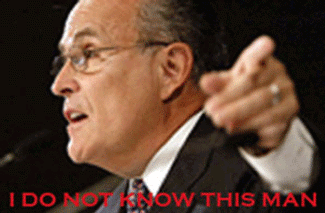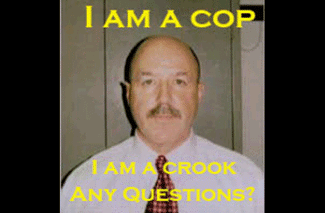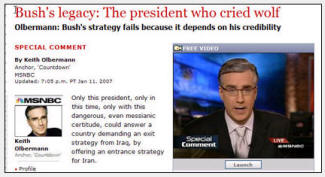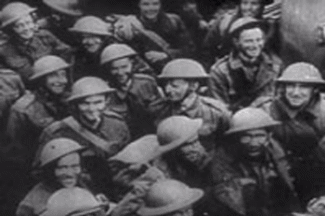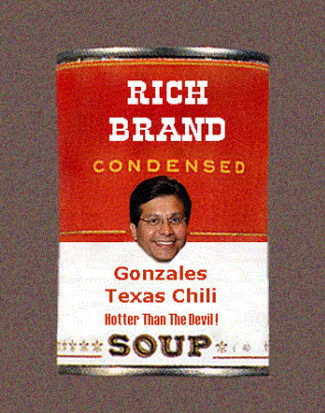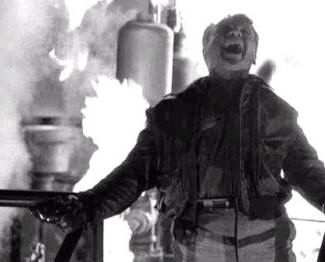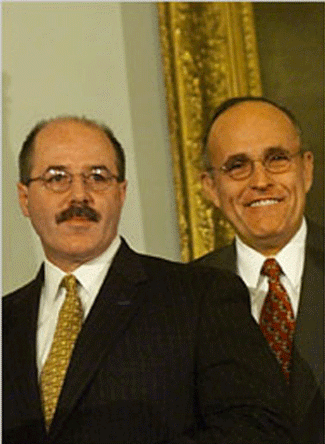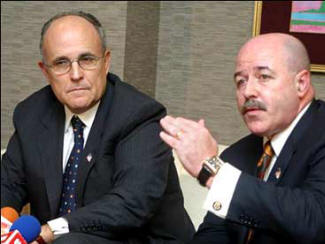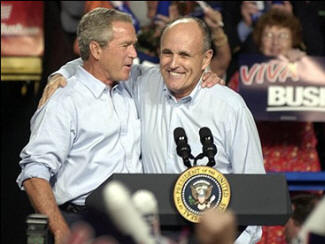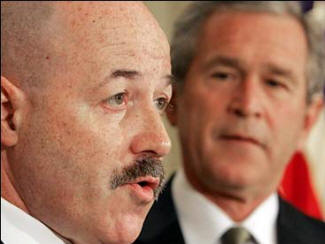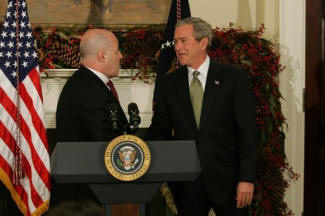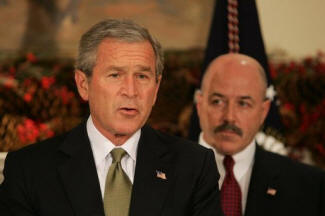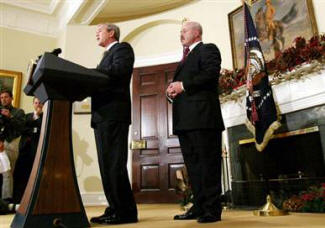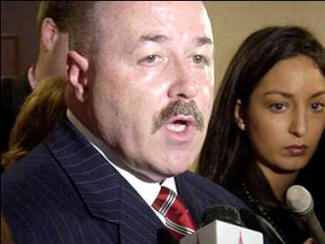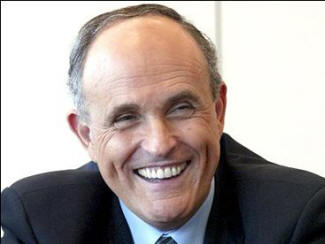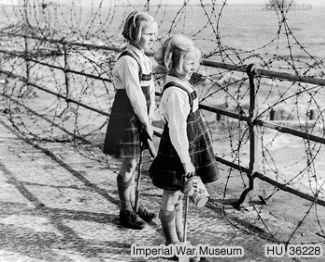January 22, 2008
By MICHAEL POWELL and RUSS BUETTNER, New York Times
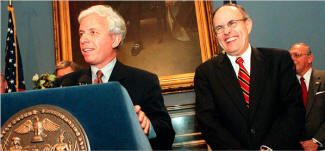 Mark Green, left, the former public advocate, with Rudolph Giuliani in December 2000. The two men often clashed, and in 1999, Mr. Giuliani attempted to rewrite the City Charter to prevent Mr. Green from succeeding him as mayor.
Mark Green, left, the former public advocate, with Rudolph Giuliani in December 2000. The two men often clashed, and in 1999, Mr. Giuliani attempted to rewrite the City Charter to prevent Mr. Green from succeeding him as mayor. Rudolph W. Giuliani likens himself to a boxer who never takes a punch without swinging back. As mayor, he made the vengeful roundhouse an instrument of government, clipping anyone who crossed him.
In August 1997, James Schillaci, a rough-hewn chauffeur from the Bronx, dialed Mayor Giuliani’s radio program on WABC-AM to complain about a red-light sting run by the police near the Bronx Zoo. When the call yielded no results, Mr. Schillaci turned to The Daily News, which then ran a photo of the red light and this front page headline: “GOTCHA!”
That morning, police officers appeared on Mr. Schillaci’s doorstep. What are you going to do, Mr. Schillaci asked, arrest me? He was joking, but the officers were not.
They slapped on handcuffs and took him to court on a 13-year-old traffic warrant. A judge threw out the charge. A police spokeswoman later read Mr. Schillaci’s decades-old criminal rap sheet to a reporter for The Daily News, a move of questionable legality because the state restricts how such information is released. She said, falsely, that he had been convicted of sodomy.
Then Mr. Giuliani took up the cudgel.
“Mr. Schillaci was posing as an altruistic whistle-blower,” the mayor told reporters at the time. “Maybe he’s dishonest enough to lie about police officers.”
Mr. Schillaci suffered an emotional breakdown, was briefly hospitalized and later received a $290,000 legal settlement from the city. “It really damaged me,” said Mr. Schillaci, now 60, massaging his face with thick hands. “I thought I was doing something good for once, my civic duty and all. Then he steps on me.”
Mr. Giuliani was a pugilist in a city of political brawlers. But far more than his predecessors, historians and politicians say, his toughness edged toward ruthlessnessand became a defining aspect of his mayoralty. One result: New York City spent at least $7 million in settling civil rights lawsuits and paying retaliatory damages during the Giuliani years.
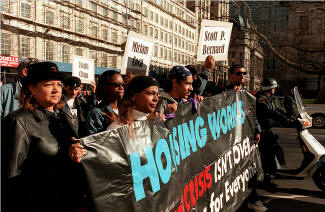 Members of Housing Works, a nonprofit group that had challenged Mr. Giuliani’s AIDS policies, marching near City Hall in 1998. The police placed snipers atop City Hall during the march and monitored it by helicopter.
Members of Housing Works, a nonprofit group that had challenged Mr. Giuliani’s AIDS policies, marching near City Hall in 1998. The police placed snipers atop City Hall during the march and monitored it by helicopter. After AIDS activists with Housing Works loudly challenged the mayor, city officials sabotaged the group’s application for a federal housing grant. A caseworker who spoke of missteps in the death of a child was fired. After unidentified city workers complained of pressure to hand contracts to Giuliani-favored organizations, investigators examined not the charges but the identity of the leakers.
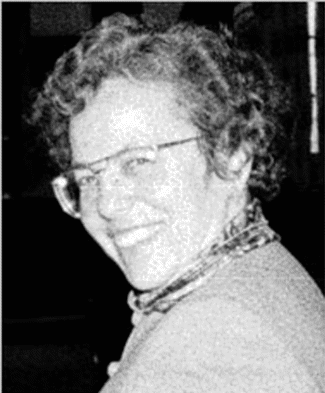 MARILYN GELBER The former Giuliani official says people were “marked for destruction.”
MARILYN GELBER The former Giuliani official says people were “marked for destruction.” “There were constant loyalty tests: ‘Will you shoot your brother?’ ” said Marilyn Gelber, who served as environmental commissioner under Mr. Giuliani. “People were marked for destruction for disloyal jokes.”
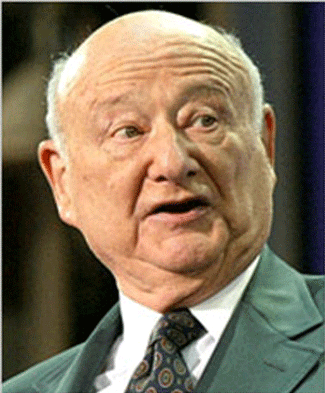 EDWARD I. KOCH His ceremonial portrait was removed from the Blue Room at City Hall.
EDWARD I. KOCH His ceremonial portrait was removed from the Blue Room at City Hall. Mr. Giuliani paid careful attention to the art of political payback. When former Mayors Edward I. Koch and David N. Dinkins spoke publicly of Mr. Giuliani’s foibles, mayoral aides removed their official portraits from the ceremonial Blue Room at City Hall. Mr. Koch, who wrote a book titled “Giuliani: Nasty Man,” shrugs.
“David Dinkins and I are lucky that Rudy didn’t cast our portraits onto a bonfire along with the First Amendment, which he enjoyed violating daily,” Mr. Koch said in a recent interview.
Mr. Giuliani retails his stories of childhood toughness, in standing up to bullies who mocked his love of opera and bridled at his Yankee loyalties. Years after leaving Manhattan College, he held a grudge against a man who beat him in a class election. He urged his commissioners to walk out of City Council hearings when questions turned hostile. But in his 2002 book “Leadership,” he said his instructions owed nothing to his temper.
“It wasn’t my sensitivities I was worried about, but the tone of civility I strived to establish throughout the city,” he wrote. Mr. Giuliani declined requests to be interviewed for this article.
His admirers, not least former Deputy Mayor Randy M. Mastro, said it was unfair to characterize the mayor as vengeful, particularly given the “Herculean task” he faced when he entered office in 1994. Mr. Giuliani’s admirers claimed that the depredations of crack, AIDS, homicide and recession had brought the city to its knees, and that he faced a sclerotic liberal establishment. He wielded intimidation as his mace and wrested cost-savings and savings from powerful unions and politicians.
“The notion that the city needed broad-based change frightened a lot of entrenched groups,” said Fred Siegel, a historian and author of “The Prince of the City: Giuliani, New York and the Genius of American Life.” “He didn’t want to be politic with them.”
He cowed many into silence. Silence ensured the flow of city money.
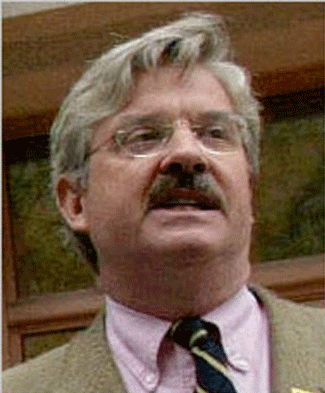 ANDY HUMM The gay activist says he muzzled himself to keep financing for AIDS programs.
ANDY HUMM The gay activist says he muzzled himself to keep financing for AIDS programs. 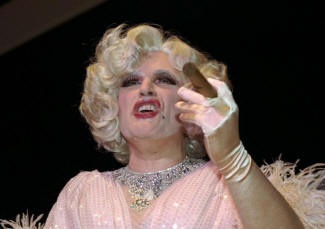 Giuliani in Drag
Giuliani in DragAndy Humm, a gay activist, worked for the Hetrick-Martin Institute, which pushed condom giveaways in public schools. When Mr. Giuliani supported a parental opt-out, the institute’s director counseled silence to avoid losing city funds. “He said, ‘We’re going to say it’s not good, but we’re not going to mention him,’ ” Mr. Humm said.
“We were muzzled, and it was a disgrace.”
Picking His Fights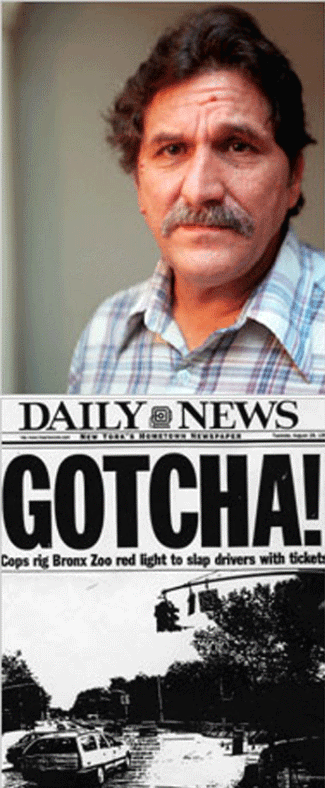 James Schillaci, top, was arrested after he sought media attention about a police sting in the Bronx. He eventually called The Daily News, which put his complaint on the front page. “The mayor tarred me up,” he says.
James Schillaci, top, was arrested after he sought media attention about a police sting in the Bronx. He eventually called The Daily News, which put his complaint on the front page. “The mayor tarred me up,” he says. Mr. Giuliani says he prefers to brawl with imposing opponents. His father, he wrote in “Leadership,” would “always emphasize: never pick on someone smaller than you. Never be a bully.”
As mayor, he picked fights with a notable lack of discrimination, challenging the city and state comptrollers, a few corporations and the odd council member. But the mayor’s fist also fell on the less powerful. In mid-May 1994, newspapers revealed that Mr. Giuliani’s youth commissioner, the Rev. John E. Brandon, suffered tax problems; more troubling revelations seemed in the offing.
At 7 p.m. on May 17, Mr. Giuliani’s press secretary dialed reporters and served up a hotter story: A former youth commissioner under Mr. Dinkins, Richard L. Murphy, had ladled millions of dollars to supporters of the former mayor. And someone had destroyed Department of Youth Services records and hard drives and stolen computers in an apparent effort to obscure what had happened to that money.
“My immediate goal is to get rid of the stealing, to get rid of the corruption,” Mr. Giuliani told The Daily News.
None of it was true. In 1995, the Department of Investigation found no politically motivated contracts and no theft by senior officials. But Mr. Murphy’s professional life was wrecked.
“I was soiled merchandise — the taint just lingers,” Mr. Murphy said in a recent interview.
Not long after, a major foundation recruited Mr. Murphy to work on the West Coast. The group wanted him to replicate his much-honored concept of opening schools at night as community centers. A senior Giuliani official called the foundation — a move a former mayoral official confirmed on the condition of anonymity for fear of embarrassing the organization — and the prospective job disappeared.
“He goes to people and makes them complicit in his revenge,” Mr. Murphy said.
This theme repeats. Two private employers in New York City, neither of which wanted to be identified because they feared retaliation should Mr. Giuliani be elected president, said the mayor’s office exerted pressure not to hire former Dinkins officials. When Mr. Giuliani battled schools Chancellor Ramon C. Cortines, he demanded that Mr. Cortines prove his loyalty by firing the press spokesman, John Beckman.
Mr. Beckman’s offense? He had worked in the Dinkins administration. “I found it,” Mr. Beckman said in an interview, “a really unfortunate example of how to govern.”
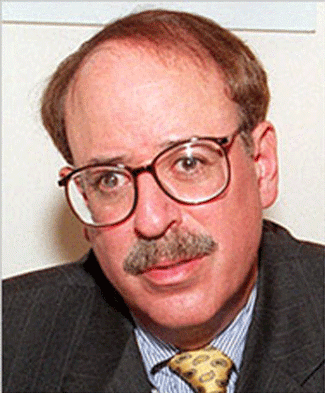 JOEL BERGER Ran afoul of Mr. Giuliani after representing victims of police brutality.
JOEL BERGER Ran afoul of Mr. Giuliani after representing victims of police brutality. Joel Berger worked as a senior litigator in the city corporation counsel’s office until 1996. Afterward, he represented victims of police brutality and taught a class at the New York University School of Law, and his students served apprenticeships with the corporation counsel.
In late August 1997, Mr. Berger wrote a column in The New York Times criticizing Mr. Giuliani’s record on police brutality. A week later, a city official called the director of the N.Y.U. law school’s clinical programs and demanded that Mr. Berger be removed from the course. Otherwise, the official said, we will suspend the corporation counsel apprenticeship, according to Mr. Berger and an N.Y.U. official.
“It was ridiculously petty,” Mr. Berger said.
N.Y.U. declined to replace Mr. Berger and instead suspended the class after that semester.
‘Culture of Retaliation’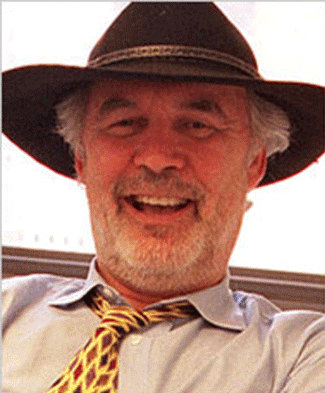 RAYMOND HORTON President of the Citizens Budget Commission, which the mayor denounced.
RAYMOND HORTON President of the Citizens Budget Commission, which the mayor denounced. The Citizens Budget Commission has driven mayors of various ideological stripes to distraction since it was founded in 1932. The business-backed group bird-dogs the city’s fiscal management with an unsparing eye. But its analysts are fonts of creative thinking, and Mr. Giuliani asked Raymond Horton, the group’s president, to serve on his transition committee in 1993.
That comity was long gone by the autumn of 1997, when Mr. Giuliani faced re-election. Ruth Messinger, the mayor’s Democratic opponent, cited the commission’s work, and the mayor denounced the group, which had issued critical reports on welfare reform, police inefficiency and the city budget.
So far, so typical for mayors and their relationship with the commission. Mr. Koch once banned his officials from attending the group’s annual retreat. Another time, he attended and gave a speech excoriating the commission.
But one of Mr. Giuliani’s deputy mayors, Joseph Lhota, took an unprecedented step. He called major securities firms that underwrite city bonds and discouraged them from buying seats at the commission’s annual fund-raising dinner. Because Mr. Lhota played a key role in selecting the investment firms that underwrote the bonds, his calls raised an ethical tempest.
Apologizing struck Mr. Giuliani as silly.
“We are sending exactly the right message,” he said. “Their reports are pretty useless; they are a dilettante organization.”
Still, that dinner was a rousing success. “All mayors have thin skins, but Rudy has the thinnest skin of all,” Mr. Horton said.
Mr. Giuliani’s war with the nonprofit group Housing Works was more operatic. Housing Works runs nationally respected programs for the homeless, the mentally ill and people who are infected with H.I.V. But it weds that service to a 1960s straight-from-the-rice-paddies guerrilla ethos.
The group’s members marched on City Hall, staged sit-ins, and delighted in singling out city officials for opprobrium. Mr. Giuliani, who considered doing away with the Division of AIDS Services, became their favorite mayor in effigy.
Mr. Giuliani responded in kind. His police commanders stationed snipers atop City Hall and sent helicopters whirling overhead when 100 or so unarmed Housing Works protesters marched nearby in 1998. A year earlier, his officials systematically killed $6 million worth of contracts with the group, saying it had mismanaged funds.
Housing Works sued the city and discovered that officials had rescored a federal evaluation form to ensure that the group lost a grant from the Department of Housing and Urban Development.
Martin Oesterreich, the city’s homeless commissioner, denied wrongdoing but acknowledged that his job might have been forfeited if Housing Works had obtained that contract.
“That possibility could have happened,” Mr. Oesterreich told a federal judge.
The mayor’s fingerprints could not be found on every decision. But his enemies were widely known.
“The culture of retaliation was really quite remarkable,” said Matthew D. Brinckerhoff, the lawyer who represented Housing Works. “Up and down the food chain, everyone knew what this guy demanded.”
The Charter FightThe mayor’s wartime style of governance reached an exhaustion point in the late 1990s. His poll numbers dipped, and the courts routinely ruled against the city, upholding the New York Civil Liberties Union in 23 of its 27 free-speech challenges during Mr. Giuliani’s mayoralty. After he left office, the city agreed to pay $327,000 to a black police officer who was fired because he had testified before the City Council about police brutality toward blacks. The city also agreed to rescind the firing of the caseworker who talked about a child’s death.
In 1999, Mr. Giuliani explored a run for the United States Senate. If he won that seat, he would leave the mayor’s office a year early. The City Charter dictated that Mark Green, the public advocate, would succeed him.
That prospect was intolerable to Mr. Giuliani. Few politicians crawled under the mayor’s skin as skillfully as Mr. Green. “Idiotic” and “inane” were some of the kinder words that Mr. Giuliani sent winging toward the public advocate, who delighted in verbally tweaking the mayor.
So Mr. Giuliani announced in June 1999 that a Charter Revision Commission, stocked with his loyalists, would explore changing the line of mayoral succession. Mr. Giuliani told The New York Times Magazine that he might not have initiated the charter review campaign if Mr. Green were not the public advocate. Three former mayors declared themselves appalled; Mr. Koch fired the loudest cannonade. “You ought to be ashamed of yourself, Mr. Mayor,” he said during a news conference.
Frederick A. O. Schwarz Jr., chairman of a Charter Revision Commission a decade earlier, wrote a letter to Mr. Giuliani warning that “targeting a particular person” would “smack of personal politics and predilections.
“All this is not worthy of you, or our city,” Mr. Schwarz wrote.
Mr. Mastro, who had left the administration, agreed to serve as the commission chairman. He eventually announced that a proposal requiring a special election within 60 days of a mayor’s early departure would not take effect until 2002, after both Mr. Giuliani and Mr. Green had left office. A civic group estimated that the commission spent more than a million dollars of taxpayer money on commercials before a citywide referendum on the proposal that was held in November 1999.
Voters defeated the measure, 76 percent to 24 percent. (In 2002, Mayor Michael R. Bloomberg advocated a similar charter revision that passed with little controversy.)
Mr. Green had warned the mayor that rejection loomed.
“It was simple,” Mr. Green said. “It was the mayor vindictively going after an institutional critic for doing his job.”
None of this left the mayor chastened. In March 2000, an undercover officer killed Patrick Dorismond, a security guard, during a fight when the police mistook him for a drug dealer. The outcry infuriated the mayor, who released Mr. Dorismond’s juvenile record, a document that legally was supposed to remain sealed.
The victim, Mr. Giuliani opined, was no “altar boy.” Actually, he was. (Mr. Giuliani later expressed regret without precisely apologizing.)
James Schillaci, the Bronx whistle-blower, recalled reading those comments and shuddering at the memory. “The mayor tarred me up; you know what that feels like?” he said. “I still have nightmares.”
